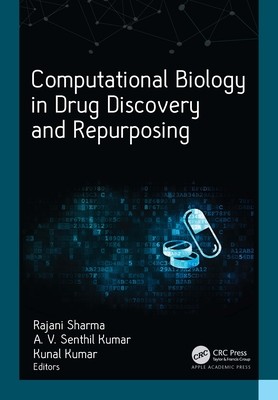
- We will send in 10–14 business days.
- Publisher: Apple Academic Press
- ISBN-10: 1774915561
- ISBN-13: 9781774915561
- Format: 17.8 x 25.4 x 2.7 cm, kieti viršeliai
- Language: English
- SAVE -10% with code: EXTRA
Computational Biology in Drug Discovery and Repurposing (e-book) (used book) | bookbook.eu
Reviews
Description
This new book, Computational Biology in Drug Designing and Drug Repurposing, takes an in-depth look at the emerging and prospective field of computational biology and bioinformatics, which possesses the ability to analyze large accumulated biological data collected from sequence analysis of proteins and genes and cell population for new drug discovery and new biology. The book explains the basic methodology associated with a bioinformatics and computational approach in drug designing. It then goes on to cover the implementation of computational programming, bioinformatics, pharmacophore modeling, biotechnological techniques, and pharmaceutical chemistry in designing drugs. The major advantage of intervention of computer language or programming is to cut down the number of steps and costs in the field of drug designing, reducing the repeating steps and saving time in screening the potent component for drug or vaccine designing.
The book is divided into sections that cover:
Part 1: Scientific Approaches to Data Retrieval and the Role of AI
Part 2: Computational Approaches and Bioinformatics Information and Applications.
Part 3: Drug Repurposing
Part 4: Research Application of Computer-Aided Drug Designing (CADD) and Drug Repurposing
The book describes algorithms used for drug designing and the use of machine learning and AI in drug delivery and disease diagnosis, which are valuable in clinical decision-making. The implementation of robotics in different diseases like stroke, cancer, COVID-19, etc. is also addressed.
Topics include machine learning, AI, databases in drug design, molecular docking, bioinformatics tools, target-based drug design, and immunoinformatics, chemoinformatics, and nanoinformatics in drug design. Drug repurposing in drug design in general as well as for specific diseases, including cancer, Alzheimer's disease, tuberculosis, COVID-19, etc., is also addressed in depth.
Written for a broad audience and to meet the current demand in the medical field, this volume will be valuable for researchers from the field of chemistry, biology, and computer science, including healthcare professionals and those in the pharma sectors.
EXTRA 10 % discount with code: EXTRA
The promotion ends in 21d.02:22:50
The discount code is valid when purchasing from 10 €. Discounts do not stack.
- Publisher: Apple Academic Press
- ISBN-10: 1774915561
- ISBN-13: 9781774915561
- Format: 17.8 x 25.4 x 2.7 cm, kieti viršeliai
- Language: English English
This new book, Computational Biology in Drug Designing and Drug Repurposing, takes an in-depth look at the emerging and prospective field of computational biology and bioinformatics, which possesses the ability to analyze large accumulated biological data collected from sequence analysis of proteins and genes and cell population for new drug discovery and new biology. The book explains the basic methodology associated with a bioinformatics and computational approach in drug designing. It then goes on to cover the implementation of computational programming, bioinformatics, pharmacophore modeling, biotechnological techniques, and pharmaceutical chemistry in designing drugs. The major advantage of intervention of computer language or programming is to cut down the number of steps and costs in the field of drug designing, reducing the repeating steps and saving time in screening the potent component for drug or vaccine designing.
The book is divided into sections that cover:
Part 1: Scientific Approaches to Data Retrieval and the Role of AI
Part 2: Computational Approaches and Bioinformatics Information and Applications.
Part 3: Drug Repurposing
Part 4: Research Application of Computer-Aided Drug Designing (CADD) and Drug Repurposing
The book describes algorithms used for drug designing and the use of machine learning and AI in drug delivery and disease diagnosis, which are valuable in clinical decision-making. The implementation of robotics in different diseases like stroke, cancer, COVID-19, etc. is also addressed.
Topics include machine learning, AI, databases in drug design, molecular docking, bioinformatics tools, target-based drug design, and immunoinformatics, chemoinformatics, and nanoinformatics in drug design. Drug repurposing in drug design in general as well as for specific diseases, including cancer, Alzheimer's disease, tuberculosis, COVID-19, etc., is also addressed in depth.
Written for a broad audience and to meet the current demand in the medical field, this volume will be valuable for researchers from the field of chemistry, biology, and computer science, including healthcare professionals and those in the pharma sectors.


Reviews